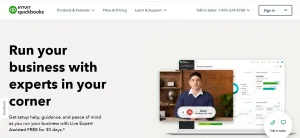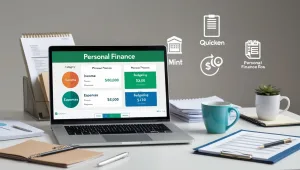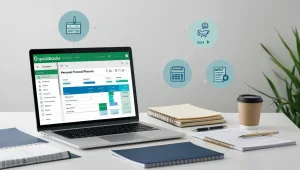
QuickBooks is one of the most popular accounting software platforms available today, primarily used by small businesses, freelancers, and entrepreneurs to manage their finances.
However, if you’re looking for a tool to manage your personal finances, you might be wondering, Can you use QuickBooks for personal finance? The answer is yes — but with a few caveats.
While QuickBooks wasn’t originally designed for personal use, its robust features can be adapted for managing individual income, expenses, and budgets.
This article will explore how you can use QuickBooks for personal finance and provide insights into other tools that may be better suited for your needs.
Use QuickBooks for Personal Finance
Yes, many individuals have turned to QuickBooks to manage their personal finances. Even though QuickBooks is built primarily for businesses, its ability to track income, expenses, and assets makes it a viable tool for individuals looking to stay on top of their personal financial situation.

Those who are already comfortable using QuickBooks for business purposes often find it convenient to extend its use to their personal finances for consistency and familiarity.
People who prefer to have a detailed, categorized view of their finances tend to gravitate toward QuickBooks.
It offers excellent reporting features, making it easy to see where your money is going, track spending patterns, and plan for the future.
However, it’s important to note that while it’s possible to use QuickBooks in this way, it may not be as user-friendly for personal finance as some other tools designed specifically for that purpose.
Program Like QuickBooks for Personal Use
Yes, several programs are designed specifically for personal finance management, and they may be a better fit for most individuals compared to QuickBooks.
Personal finance software options such as Mint, YNAB (You Need A Budget), or Quicken are popular choices for people managing personal budgets, expenses, and investments.
- Mint is a free, web-based tool that links to your bank accounts, credit cards, and investment accounts, helping you track your spending, create budgets, and monitor your financial goals. It’s ideal for those who prefer an automated solution.
- YNAB is perfect for proactive budgeting and emphasizes giving every dollar a job. It’s great for people looking to save money, get out of debt, and take more control over their finances.
- Quicken offers a more comprehensive suite of features, making it similar to QuickBooks, but specifically designed for personal financial management. It allows you to manage your personal finances with more complexity than Mint, tracking investments, assets, debts, and more.
These tools are often simpler to use for personal finance, offering a more intuitive user interface and fewer features related to business accounting that you may not need.
You Track Personal Finances in QuickBooks

Yes, you can track personal finances in QuickBooks. By customizing categories to reflect your personal income and expenses, QuickBooks can serve as a powerful tool for managing personal financial matters. Some ways you can track personal finances include:
- Income and Expense Tracking: QuickBooks allows you to track your income from multiple sources, such as salary, freelance work, or investment income. You can also categorize and track personal expenses like rent, utilities, groceries, and entertainment.
- Bank and Credit Card Integration: You can link your personal bank accounts, credit cards, and even investments to QuickBooks to automatically track your financial transactions in real time.
- Custom Reports: QuickBooks lets you create custom reports that reflect your personal financial health. For example, you can generate reports showing how much you spend in specific categories, such as dining out or household bills, giving you insight into where you can cut back.
However, to make it work for personal finance, you’ll need to invest time in setting it up properly. This includes setting up your accounts, creating custom categories that fit your lifestyle, and learning how to use the features to generate reports that are relevant to your personal financial goals.
QuickBooks for Business and Personal
While QuickBooks allows you to manage both personal and business finances, it’s generally not recommended to mix the two.
Combining personal and business expenses in one account can make it difficult to maintain clear financial records, which can lead to confusion when preparing taxes or applying for business loans.
That said, if you decide to use QuickBooks for both, the best approach is to create separate accounts within the software.
This way, you can keep personal and business finances distinct from each other. QuickBooks offers the flexibility to manage multiple accounts, which allows you to track expenses, generate reports, and manage finances separately for personal and business purposes.
Can I Use QuickBooks for Myself?
Yes, you can absolutely use QuickBooks to manage your personal finances.
The platform’s flexibility allows you to tailor it to your financial needs by customizing categories, adding personal accounts, and even setting up budgets for personal expenses.
However, using QuickBooks for personal finances may be overkill for some people.
The platform is designed to handle complex financial transactions, so unless you’re managing multiple streams of income, investments, and detailed personal expenses, it might feel overwhelming to use QuickBooks for just personal matters.
That’s why many individuals opt for simpler alternatives like Mint or Quicken, which are specifically designed for personal finance.
Is QuickBooks Only for Businesses?
While QuickBooks was originally developed for small businesses, it is not limited to business use only. Its powerful tracking and reporting features can easily be adapted for personal use.
The key to making it work for personal finance is knowing which features are relevant and which ones you can ignore.
For example, QuickBooks has invoicing, payroll, and inventory management tools that most individuals won’t need for personal finance management.
If you can overlook these business-specific features and focus on the personal finance tools (income tracking, expense categorization, and reporting), QuickBooks can become a robust personal finance tool.
How to Set Up QuickBooks for Personal Finances?
Setting up QuickBooks for personal finances is relatively straightforward but does require a few steps to customize it for your needs:
- Create a New Account: If you already use QuickBooks for business, create a separate account to manage personal finances. This will help avoid confusion between personal and business expenses.
- Customize Categories: QuickBooks allows you to create custom categories for income and expenses. For personal finances, you’ll want to set up categories such as “Rent/Mortgage,” “Utilities,” “Groceries,” “Entertainment,” and “Savings.” These categories will help you track your spending habits effectively.
- Link Personal Accounts: You can link your personal bank accounts, credit cards, and other financial institutions to QuickBooks to automate transaction tracking.
- Set Up a Budget: QuickBooks allows you to create budgets, just as you would for a business. Set monthly or yearly budgets for categories such as food, housing, and entertainment, and track how well you stick to your budget.
- Generate Reports: Once your accounts and categories are set up, you can generate custom reports to get a snapshot of your financial health. For example, you can create a cash flow report to see your monthly income versus expenses.
Use QuickBooks Without a Business
Yes, QuickBooks can be used without a business. Even though the software is designed with businesses in mind, individuals can still benefit from its tracking and reporting features for personal finance.
However, if you’re only looking for basic personal finance management tools, QuickBooks may feel too complex. In that case, opting for a platform like Quicken, Mint, or YNAB may be a more appropriate choice.
Can You Use Accounting Software for Personal Use?
Absolutely. Many individuals use accounting software to manage personal finances, especially those with more complicated financial situations involving investments, rental properties, or freelance income. While QuickBooks can be used for personal finance, other options may be more intuitive and suited for individuals, such as Mint, Quicken, or YNAB.
The decision to use QuickBooks or any other accounting software for personal finance depends on your comfort level with the platform and how complex your financial needs are. If you’re looking for simplicity, a program specifically designed for personal use might be a better fit.
Conclusion
While QuickBooks can be adapted for personal finance, it’s not always the most user-friendly or practical option for everyone.
If you’re already familiar with QuickBooks and want to use it to manage your personal finances, it can certainly handle the job with some customization. However, for most individuals, tools like Mint, Quicken, or YNAB may offer a simpler, more tailored experience.
Ultimately, the best platform for managing your personal finances depends on your financial complexity and personal preferences.

Karthick Raja, MBA, is a personal finance educator and HR professional with 10+ years of experience in Personal Finance ,taxation, payroll, and career development. He helps readers build wealth, manage money wisely, and grow professionally.



